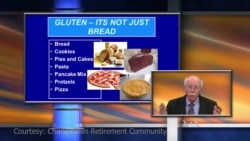Senior citizens who move to Charlestown Retirement Community in Catonsville, Maryland, have a chance to start new careers in television. No matter what they did before retiring, they’re encouraged to participate in creating a range of programs broadcast on channel 972, a closed circuit 24-hour TV station. Their active participation benefits them and their community.
Accepting aging
Retired physician Stephen Schimpff is one of the residents-turned-TV-stars at Charlestown. He hosts two shows, Megatrends in Medicine and Aging Gracefully. Both deal with nutrition and lifestyle.
“It’s not giving medical advice on a problem,” he said. “I clearly avoid doing that. I say to people, if you have a problem go to the health center and see your doctor. But we deal with issues about aging. How our bodies age, the actual physiology of it, some of the mechanisms, and how we can affect that. We can affect it with our lifestyle. How can we increase the quality of food and reduce stress? What type of exercise do we really need? We’ve been also asked about supplements, should we be taking vitamins?”
Schimpff says the biggest issue about aging for most people is accepting it.
“If I go look in a mirror, I see a person who is older than I think I am. I say, ‘Gosh, when did he get older?’ because I don’t feel old. It is a thing about accepting, but not in a negative way, in a very positive way. We’re all getting older, everyone does. How can we make the best use of that time?”
Seeing themselves on TV
Community TV manager Tom Moore says viewers like Schimpff’s shows because they see themselves in it. That’s also the case with the other shows hosted by residents.
“When I have residents involved in TV production,” he said, “it truly becomes public TV because they can voice things from their perspective, which myself and the staff may not be able to adequately do.”
Residents participate in reading announcement and the daily newscasts. They are creating shows that cover a wide variety of topics, from history and careers to fitness and hobbies.
“We have shows that talk about residents and their pets,” Moore said. “We can easily highlight residents’ pets, but we also want to talk about how to take care of a pet as you get older, both the pet and ourselves, to take care of a pet while living in a community with 2,000 people. We do a program that looks at people’s apartments. People love to go behind the doors of other people’s homes and see what’s in there. We have programs where we interview our residents and staff. We do garden tours because the residents have their own gardens here, whether it’s outside of their patios of their apartments. Or we have a public space where you can grow gardens, where if you want to grow vegetables, you can do that. So we tour those gardens with that resident and show people what the gardens look like and give them some gardening tips also.”
Exploring the world
The environment at Charlestown invites new show ideas.
“We’re open to almost everything,” Moore said. “So if a resident comes to me and says, ‘You should do a program about something,’ I will often say, ‘Will you help me with that?’”
That’s what happened when Eugenia High, a former social worker, moved to the community a couple of years ago.
“I told him that travel is my passion,” she said. “That’s when he said, ‘Well, maybe you might want to use a video camera to record some of your trips and you could share it with other residents here.’”
So she learned to use a video camera. On each trip, High explores on a certain theme. On her recent trip to Iceland, for example, she focused on nature, while in Mongolia, she was attracted to culture and traditions.
“We went to one place in Iceland where the tectonic plates come together. And we were able to look down that reef and it was scary. In Mongolia, we visited a school or a cultural center where they teach children about traditional values and culture, like dancing and playing music on traditional instruments.”
High is now preparing to host another show that’s also about traveling.
“What I will be doing is interviewing residents who have gone on different trips, and I’ll be asking them questions about maybe why they chose that trip? What happened during the trip?”
Active retirement
Shortly after the Charlestown Retirement Community was founded in 1983, the directors launched the closed circuit TV station, hoping to connect residents. The television channel has evolved over the years and became more popular when residents started to volunteer to help with its programming. The community’s executive director, Clara Parker, says Channel 972 reflects what active retirement can be.
“Retirement living here is not a place where you come and be taken care of, it’s a place to come and live and thrive,” Parker said. “We do have residents who are homebound and can’t get out. So the TV is a way for them to be part of the community, to engage with their neighbors, to experience from a peer’s perspective what’s going on and it makes it relatable for them.”
That’s how Channel 972 keeps the community connected and helps the residents stay active and creative.









